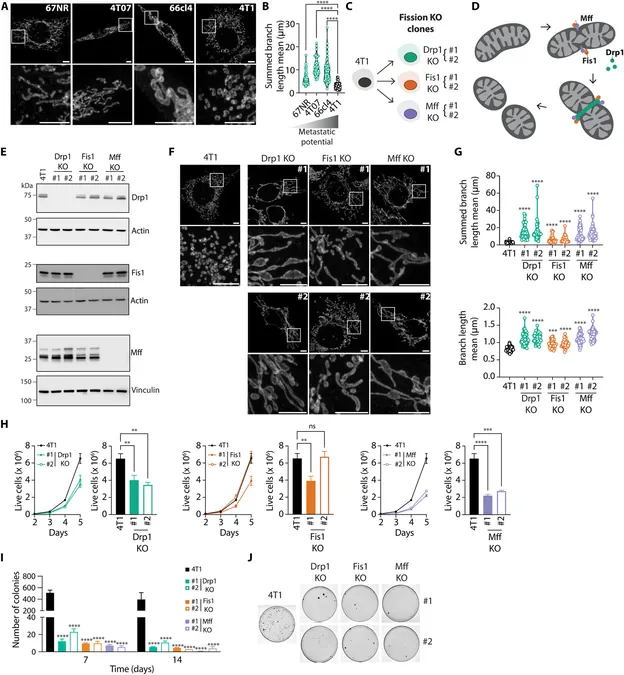
Revolutionary Study Reveals How Mitochondrial Dynamics Could Curb Breast Cancer Metastasis!
2024-11-07
Author: Sarah
Introduction
In the intricate landscape of human cells, mitochondria are often referred to as the powerhouses, providing the essential energy needed for cellular functions. However, new research led by Dr. Julie St-Pierre from the Faculty of Medicine at the University of Ottawa has unveiled a fascinating connection between mitochondrial behavior and the aggressive spread of breast cancer, the most commonly diagnosed cancer among women worldwide.
Research Insights
This collaborative study published in Science Advances dives deep into the dynamics of mitochondria, particularly their ability to shape-shift through processes of fusion and fission. Historically, scientists have been curious about how these processes impact cancer progression, particularly metastasis—the stage at which cancer cells spread to distant sites in the body, often leading to fatal outcomes.
The research team has discovered groundbreaking evidence suggesting that inducing a fusion of mitochondria in breast cancer cells significantly hinders their metastatic potential. “Our findings indicate that fostering a fused mitochondrial network can drastically limit the ability of these cells to spread,” Dr. St-Pierre commented, highlighting the urgency of addressing metastasis, a leading cause of cancer-related deaths.
Methodology and Findings
Dr. Lucía Minarrieta, the study's first author and a postdoctoral fellow at uOttawa, elaborated on their methodology. The researchers experimented with various techniques to encourage mitochondrial elongation in cancer cells. Their investigation revealed an intriguing correlation: breast cancer cells exhibiting longer mitochondria are typically associated with lower metastatic potential. “This observation suggests that a fragmented mitochondrial structure might be linked to more aggressive forms of the disease,” Dr. Minarrieta explained.
Furthermore, the researchers employed a unique "elongation signature" as a benchmark to assess mitochondrial morphology, discovering that a higher elongation score correlates with improved patient outcomes, even among those with aggressive cancer subtypes. This finding presents a potential game-changer in managing breast cancer recurrence, especially given how metastatic breast cancer often emerges after patients have been declared cancer-free.
Therapeutic Potential
In an exciting twist, the study also explored the potential of repurposing an existing FDA-approved drug, leflunomide, traditionally used as an antirheumatic treatment. The drug showed promise in facilitating mitochondrial elongation and could pave the way for new therapeutic strategies aimed at combating metastatic disease. “Investigating leflunomide and its effects on cancer metastasis could herald an important breakthrough for treatment options,” Dr. St-Pierre stated, hinting at future clinical trials to explore these findings further.
Conclusion
This pioneering research marks a significant step forward in our understanding of cancer biology, particularly in the realm of targeting mitochondrial dynamics. With the collaborative effort of experts including Dr. Peter Siegel from McGill University and Dr. Mireille Khacho from the University of Ottawa, this study not only sheds light on the complexities of breast cancer but also opens the door for innovative therapeutic interventions.
Stay tuned as this groundbreaking study may hold the key to transforming how we think about and tackle one of the most challenging aspects of cancer treatment!



 Brasil (PT)
Brasil (PT)
 Canada (EN)
Canada (EN)
 Chile (ES)
Chile (ES)
 España (ES)
España (ES)
 France (FR)
France (FR)
 Hong Kong (EN)
Hong Kong (EN)
 Italia (IT)
Italia (IT)
 日本 (JA)
日本 (JA)
 Magyarország (HU)
Magyarország (HU)
 Norge (NO)
Norge (NO)
 Polska (PL)
Polska (PL)
 Schweiz (DE)
Schweiz (DE)
 Singapore (EN)
Singapore (EN)
 Sverige (SV)
Sverige (SV)
 Suomi (FI)
Suomi (FI)
 Türkiye (TR)
Türkiye (TR)